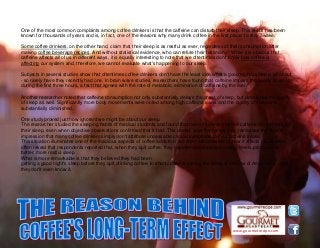
The reason behind coffee's long term effect
- 1. www.gourmetrecipe.com One of the most common complaints among coffee drinkers is that the caffeine can disturb their sleep. This result has been known for thousands of years and is, in fact, one of the reasons why many drink coffee in the first place: to stay awake. Some coffee drinkers, on the other hand, claim that their sleep is as restful as ever, regardless of their consumption after making coffee beverage recipes. And without statistical evidence, who can refute their testimony? While it is obvious that caffeine affects all of us in different ways, it is equally interesting to note that we oftentimes don't know how coffee is affecting our system and, therefore, we cannot evaluate what's happening to our sleep. Subjects in several studies show that oftentimes coffee drinkers don't have the least idea what a good night's sleep is all about - so rarely have they recently had one. In brain wave studies, researchers have found that caffeine impairs the quality of sleep during the first three hours, a fact that agrees with the rate of metabolic elimination of caffeine by the liver. Another researcher noted that caffeine consumption not only substantially delays the onset of sleep, but diminishes the quality of sleep as well. Significantly more body movements were noted among high caffeine users and the quality of sleep was substantially diminished. One study proved just how ignorant we might be about our sleep. The researcher studied the sleeping habits of medical students and found that many students claimed caffeine did not disturb their sleep, even when objective observations confirmed that it had. This denial, says the researcher, reinforces the clinical impression that many coffee drinkers simply don't attribute undesirable clinical symptoms to their caffeine intake. This situation illuminates one of the insidious aspects of coffee addiction: we often are unaware of how it affects us. Studies often reveal that respondents reported that, when they quit coffee, they experienced improved energy levels produced by better, more restful sleep. What is more remarkable is that they believed they had been getting a good night's sleep before they quit drinking coffee. In short,coffee is ruining the sleep of millions of Americans - and they don't even know it.
